July 21st, 2008 by Eugene Barsky | No Comments »
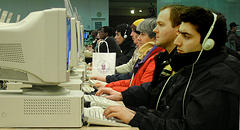
The 2007 Canadian Internet Use Survey was released on June 12th.
Interesting findings include:
“Almost three-quarters (73%), or 19.2 million Canadians aged 16 and older, went online for personal reasons during the 12 months prior to the survey. This was up from just over two-thirds (68%) in 2005 when the survey was last conducted. For the first time, the survey covered young people aged 16 and 17. They accounted for almost one of the five percentage point increase in Internet use between 2005 and 2007.”
“Among people who used the Internet at home, 68% went online every day during a typical month and 50% for five hours or more during a typical week. On average, men were online more often and for longer periods than women.”
“High-speed connections are becoming far more prevalent. An estimated 88% of people who accessed the Internet at home did so with a high-speed connection in 2007, up from 80% two years earlier. This growth was driven by new users and by existing users switching from a slower service.
Over 9 in 10 urban home users reported using a high-speed connection, compared with just over 7 in 10 home users in rural areas. More than one-half of rural and small town residents using a slower service reported that a high-speed telephone or cable service was not available in their area.”
More Canadians are participating in blogging, chatting and downloading. Internet use rates are highest in British Columbia, Alberta and Ontario.
Found via Stephen’s Lighthouse
** Photo by striatic
Posted in General Science, Main, Mathematics, News, Science - undegraduate classes, Statistics | No Comments »
July 15th, 2008 by Kevin Lindstrom | 1 Comment »
Dr. Tom Pedersen has co-authored an interesting editorial published in the journal Marine Pollution Bulletin looking at natural sewage treatment as it relates to the city of Victoria’s current policy of discharging screened sewage into the ocean environment.
“Despite scientific evidence that there are no major environmental or human health impacts, this discharge of ‘untreated’ sewage has been a constant irritation to the city’s US neighbours and to environmental groups, has resulted in a large number of lay opinions in the popular media (radio, television, newspapers, magazines), and finally resulted (July 2006) in the British Columbia Minister of the Environment directing the CRD to move to secondary sewage treatment.”
For more on this topic, have a look at Peter Chapman’s editorial Science, politics and ideology – The Victoria (BC, Canada) sewage issue.
Dr. Tom Pederson is a professor in UBC’s Department of Earth and Ocean Sciences.
Posted in Chemical and Biological Engineering, Civil Engineering, Earth and Ocean Sciences, General Science, Main, News | 1 Comment »
July 14th, 2008 by Eugene Barsky | No Comments »
Here is the handout we are going to use for our “Mastering Google for Science and Engineering” workshops this week on July 16 and July 17, 2008
Here is the PDF copy. You can also see the embedded copy below. Please let us know if you have any questions!
Posted in Main, Teaching | No Comments »
July 11th, 2008 by Eugene Barsky | No Comments »
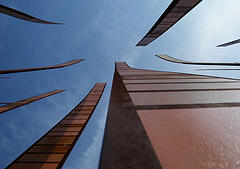
On 4 July 2008 Science had an editorial about peer-review process.
http://www.sciencemag.org/cgi/content/full/321/5885/15
Written by the Science editors, including Bruce Alberts – the Editor-in-Chief, it is indeed an interesting read! Have a look..
** Photo by selva
Posted in Chemical and Biological Engineering, Chemistry, Civil Engineering, Earth and Ocean Sciences, General Science, Main, Mathematics, Mechanical Engineering, Physics, Science - undegraduate classes, Statistics, Wood Sciences | No Comments »
July 9th, 2008 by Eugene Barsky | No Comments »
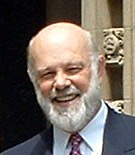
Geography Professor Emeritus Timothy R. Oke is appointed to Order of Canada.
He is recognised for his research in meteorology and urban climatology, and his mentoring of generations of geographers.
http://www.publicaffairs.ubc.ca/ubcreports/extras/2008/08jul02.html
**Photo from this page: http://www.geog.ubc.ca/~toke/
Posted in Earth and Ocean Sciences, Main | No Comments »
July 3rd, 2008 by Eugene Barsky | 1 Comment »
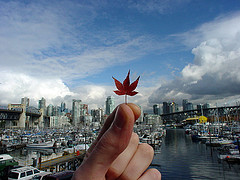
On June 15, 2008 Thomson Reuters ISI has published a short report about Canadian Science. Canada’s world share of science and social-science papers over the last five years is expressed as a percentage of papers in each of 22 fields in the Thomson Reuters ISI database. Also, Canada’s relative citation impact compared to the world average in each field, in percentage terms.
http://sciencewatch.com/dr/sci/08/jun15-08_2/
It is a very interesting read that shows that Canadians scientists are most prominent in Psychology/Psychiatry and Ecology/Environmental and least prominent in Chemistry and Physics. Frankly, the whole thing surprised me very much!
What do you see in this report? Does it surprise you?
** Photo by jmv
Posted in Chemical and Biological Engineering, Chemistry, Civil Engineering, Earth and Ocean Sciences, General Science, Main, Mathematics, Mechanical Engineering, News, Physics, Science - undegraduate classes, Statistics, Wood Sciences | 1 Comment »
June 30th, 2008 by Eugene Barsky | No Comments »
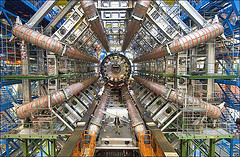
CNN runs an article today about the CERN’s Large Hadron Collider.
The article raises some fears that the Large Hadron Collider could exceed physicists’ wildest conjectures: Will it spawn a black hole that could swallow Earth? Or spit out particles that could turn the planet into a hot dead clump?
The article tries to answer those questions with CERN and other physicists. A very nice read – here is the full text – http://www.cnn.com/2008/TECH/06/30/doomsdaycollider.ap/index.html
The comments are open for any UBC folks that are willing to address this issue 🙂 After all, we have our own system here at UBC – at TRIUMF…
Thanks to Anne Miele for the link.
** Photo by Image Editor
Posted in General Science, Main, News, Physics, Science - undegraduate classes | No Comments »
June 6th, 2008 by Kevin Lindstrom | 1 Comment »
A team of physicists at the Californian Institute of Technology has claimed that our view of the early Universe may contain the signature of a time before the Big Bang.
Dr Adrienne Erickcek, and colleagues from the California Institute for Technology (Caltech), now believes these fluctuations contain hints that our Universe “bubbled off” from a previous one.
Their data comes from Nasa’s Wilkinson Microwave Anisotropy Probe (WMAP), which has been studying the Cosmic Microwage Background since its launch in 2001.
Their model suggests that new universes could be created spontaneously from apparently empty space. From inside the parent universe, the event would be surprisingly unspectacular.
Click here to read the full BBC news article
The preprint version of the article submitted to Physical Review Letters, A Hemispherical Power Asymmetry from Inflation is available at arxiv.org.
There is a UBC connection to this research. Dr. Mark Halpern from UBC’s Department of Physics and Astronomy is directly involved in
WMAP Research and is a member of the WMAP Science Team.
Posted in General Science, Main, Physics, Science - undegraduate classes | 1 Comment »
June 4th, 2008 by Eugene Barsky | No Comments »
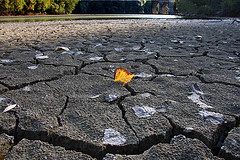
This long awaited report by the US Climate Change Science Program analyzes the effects of global change on natural and human environments, agriculture, water resources, social systems, energy production and use, transportation, and human health. It analyzes current trends in global change, both natural and human-induced, and it projects major trends for the future.
On their site – http://www.climatescience.gov/Library/scientific-assessment/ you can find the full report, the executive summary and other related materials.
** Photo by Enzo D
Posted in Earth and Ocean Sciences, General Science, Main, News, Science - undegraduate classes | No Comments »
June 2nd, 2008 by Eugene Barsky | No Comments »

Brian Greene, a professor of physics at Columbia, and the author of The Elegant Universe and The Fabric of the Cosmos, writes about “the powerful role science can play in giving life context and meaning.”
Put a Little Science in Your Life
** photo by smiling_da_vinci
Posted in Main, News | No Comments »







